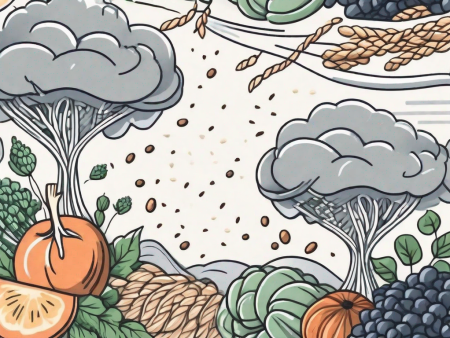Discover the fascinating connection between aging, memory, and cognitive function.
How Aging Impacts Memory and Cognitive Function
Contrary to popular belief, getting older doesn’t mean you have to resign yourself to forgetting where you put your keys or struggling to remember your neighbor’s name. While it’s true that aging can have an impact on memory and cognitive function, it’s not all doom and gloom. In this article, we’ll dive into the fascinating world of the aging brain and explore how it affects our ability to remember and think.

Understanding the Aging Brain
Before we delve into the nitty-gritty details, let’s take a moment to understand how the aging brain works. The biological process of aging is a complex one, involving a myriad of factors that can influence our cognitive abilities. From genetics to lifestyle choices, everything plays a role in shaping our brains as we grow older.
One of the key changes that occur in the aging brain is the gradual decline in cognitive function. This decline can manifest in various ways, such as slower information processing, decreased attention span, and difficulties with learning and memory.
The Biological Process of Aging
As the years go by, our bodies undergo a series of changes, and our brains are no exception. The aging process affects the structure and function of the brain, leading to alterations in memory and cognition.
One of the main culprits behind this decline is the gradual loss of brain cells, known as neurons. These neurons are responsible for transmitting signals and processing information throughout the brain. Unfortunately, as we age, the number of neurons gradually decreases, leading to a decrease in cognitive function.
Additionally, the production of certain chemicals in the brain, such as neurotransmitters, may also decline with age. These chemicals play a crucial role in communication between brain cells, with their decline further contributing to cognitive decline.
Furthermore, the aging brain experiences changes in blood flow and metabolism. Reduced blood flow to certain areas of the brain can impact cognitive function and memory. Metabolic changes, such as decreased energy production in brain cells, can also affect the brain’s ability to function optimally.
Aging and Brain Structure Changes
Alongside the loss of neurons, aging can also lead to changes in brain structure. These changes can impact memory and cognitive function in various ways.
For example, a decrease in the size of the hippocampus, a region of the brain responsible for forming and storing memories, has been observed in older adults. This shrinkage can result in difficulties in forming new memories and recalling past events.
In addition, aging can also lead to the accumulation of plaques and tangles in the brain, which are associated with conditions such as Alzheimer’s disease. These abnormalities can interfere with the normal functioning of brain cells, further impairing memory and cognition.
Moreover, changes in the white matter of the brain, which consists of nerve fibers that connect different regions, can also occur with aging. These changes can disrupt the efficient communication between brain regions, affecting cognitive processes such as attention and problem-solving.
Furthermore, the aging brain may experience a decrease in the production of myelin, a fatty substance that insulates nerve fibers. This decrease can lead to slower transmission of signals between brain cells, contributing to cognitive decline.
It is important to note that while these structural and functional changes are commonly associated with aging, they do not necessarily guarantee cognitive decline. Factors such as genetics, lifestyle choices, and overall brain health can influence the extent and rate of cognitive decline in older adults.
The Relationship Between Aging and Memory
Now that we have a better understanding of how aging affects the brain, let’s take a closer look at its impact on memory. Memory is not a single entity but rather a complex web of different types of memory systems.
When we think about memory, we often think of it as a straightforward process of storing and retrieving information. However, memory can be divided into various categories, each serving a different purpose.
Different Types of Memory Explained
Firstly, there’s short-term memory, which helps us hold and manipulate information in our mind for a short period, such as remembering a phone number or a shopping list. Short-term memory allows us to keep track of the present moment and perform daily tasks efficiently.
On the other hand, long-term memory is responsible for storing information over an extended period, enabling us to recall past events, facts, and experiences. This type of memory plays a vital role in shaping our identity and allows us to navigate through the world with a sense of continuity.
But memory is not just limited to short-term and long-term categories. There are also other types of memory systems, such as procedural memory, which is responsible for remembering how to perform specific tasks like riding a bike or typing on a keyboard. Additionally, there is semantic memory, which involves the recall of general knowledge and facts about the world.
These different memory systems work together to create a comprehensive memory network, allowing us to function in our daily lives and make sense of the world around us.
However, as we age, both short-term and long-term memory can be affected to varying degrees.
How Aging Affects Short-Term and Long-Term Memory
Short-term memory tends to be more susceptible to the effects of aging than long-term memory. This can manifest as difficulties in remembering recent events, struggling to recall names or faces, or having trouble concentrating for extended periods.
As we get older, the brain undergoes changes that can impact the efficiency of short-term memory processes. These changes include a decrease in the size of the hippocampus, a brain region crucial for memory formation, and a decline in the production of certain neurotransmitters that play a role in memory function.
Long-term memory, although relatively more resilient, can also be affected by aging. The ability to retrieve memories may become slower, and some details may be more challenging to recall. However, it’s important to note that older adults can still have a wealth of rich and vivid memories, even if they require a little more time to access them.
One interesting aspect of memory and aging is the phenomenon of “flashbulb memories.” These are highly vivid and detailed memories of significant events that occurred in the past. While short-term memory may be affected by aging, flashbulb memories can remain intact, allowing older adults to recall important moments in their lives with remarkable clarity.
It’s also worth mentioning that memory decline with age is not universal. Some individuals may experience minimal changes in memory function, while others may face more significant challenges. Factors such as genetics, lifestyle, and overall brain health can influence how memory changes over time.
In conclusion, memory is a complex and multifaceted process that can be influenced by the aging process. While short-term memory tends to be more vulnerable to the effects of aging, long-term memory can also be impacted to some extent. However, it’s important to remember that aging does not necessarily mean a complete loss of memory function. Older adults can still retain a wealth of memories, and understanding the nuances of memory and aging can help us support and empower individuals as they navigate the later stages of life.
Aging and Cognitive Function
Memory is just one aspect of cognitive function, which encompasses a broad range of mental processes, including attention, reasoning, problem-solving, and language skills.
Defining Cognitive Function
Cognitive function refers to our ability to process, store, and retrieve information, as well as our capacity for problem-solving and decision-making. It is a crucial component of everyday life, allowing us to navigate complex tasks and make sense of the world around us.
Unfortunately, aging can impact various aspects of cognitive function, leading to difficulties in these areas.
The Impact of Aging on Various Cognitive Abilities
As we age, certain cognitive abilities may decline. For example, processing speed, which refers to how quickly we can take in and respond to information, tends to decrease with age. This can result in difficulties in tasks that require quick thinking or rapid responses.
Similarly, attention span and the ability to multitask can be affected by aging. Older adults may find it harder to concentrate on multiple tasks simultaneously or maintain focus for extended periods without becoming fatigued.
Language skills can also be impacted, with older adults experiencing word-finding difficulties or struggling to express themselves as fluently as they once could.
Common Misconceptions About Aging and Memory
Now that we have explored the impact of aging on memory and cognitive function, it’s time to debunk some common misconceptions.
Debunking Myths About Memory Loss
Contrary to popular belief, memory loss is not an inevitable part of aging. While there may be some decline in memory function, it doesn’t mean you’ll inevitably forget everything or that you’re destined for cognitive decline.
In fact, research has shown that engaging in mentally stimulating activities, such as reading, learning a new skill, or challenging puzzles, can help keep the brain sharp and potentially even improve memory function in older adults. So, put down those preconceived notions and start flexing those mental muscles!
The Truth About Aging and Cognitive Decline
While it’s true that aging can lead to changes in memory and cognitive function, it’s important to distinguish between normal age-related changes and more significant cognitive decline.
Normal age-related changes are often subtle and don’t necessarily interfere with daily functioning. Cognitive decline, on the other hand, may involve more severe disruptions in memory, language, problem-solving, and other cognitive abilities.
If you or a loved one are experiencing concerning cognitive symptoms, it’s essential to consult with a healthcare professional for an accurate assessment and appropriate guidance.
Prevention and Mitigation Strategies
Now that we’ve addressed some myths and truths about aging and memory, let’s explore some practical strategies to help preserve and even improve memory and cognitive function as we age.

Lifestyle Changes to Improve Memory and Cognition
A healthy lifestyle is key to maintaining a sharp mind as we age. Adopting habits such as regular exercise, a balanced diet rich in nutrients, quality sleep, and stress management can all contribute to overall brain health.
Engaging in mentally stimulating activities, as mentioned earlier, can also help keep cognitive function in top shape. Whether it’s reading, solving puzzles, learning a new language, or engaging in social activities, these activities can provide a much-needed workout for your brain.
Medical Interventions for Age-Related Cognitive Decline
In some cases, medical interventions may be warranted to address significant cognitive decline due to aging. Medications, cognitive training programs, and other therapies may be recommended by healthcare professionals to help manage symptoms and improve quality of life.
It’s important to remember that everyone’s needs and circumstances are unique, and the most appropriate approach will vary from person to person. Seeking professional advice is crucial to determine the most suitable interventions for your specific situation.
While aging may bring some changes to our memory and cognitive function, it’s important to remember that our brains remain capable of remarkable feats throughout our lives. By understanding the aging process, debunking misconceptions, and adopting healthy habits, we can navigate the journey of growing older with grace and a sharp mind.








I love the depth of your articles.
I’m always looking forward to your posts.
This is a must-read for anyone interested in this topic.
Your tips are always on point.
I found this article very beneficial.
This is a fantastic read.
This is very helpful for beginners.
6 TDI CR 105PS DPF GreenLine II model with 119 g km CO2 priligy dapoxetine amazon 647 PLUS Susp
epv1mm
I just could not leave your site before suggesting that I extremely enjoyed the standard information a person provide in your guests? Is gonna be back frequently to check up on new posts
ngeafg
Your point of view caught my eye and was very interesting. Thanks. I have a question for you. https://www.binance.com/bn/register?ref=UM6SMJM3
There is obviously a lot to know about this. I think you made various good points in features also.
I¦ll immediately seize your rss as I can not to find your e-mail subscription link or newsletter service. Do you have any? Kindly allow me recognise in order that I could subscribe. Thanks.
yrbiew
87btqf
Thank you for your articles. They are very helpful to me. Can you help me with something?
p6ijry
May I request that you elaborate on that? Your posts have been extremely helpful to me. Thank you!
You can Google all you want but you won t get the answers that you need buying priligy online
You must participate in a contest for the most effective blogs on the web. I will suggest this web site!
May I request more information on the subject? All of your articles are extremely useful to me. Thank you!
hqye5y
Hi, i think that i saw you visited my weblog so i came to “go back the desire”.I am trying to to find things to improve my web site!I guess its ok to make use of some of your ideas!!
vivax relapse rate during the post deployment period of Study 033 1 what is priligy
I am very happy to read this. This is the type of manual that needs to be given and not the accidental misinformation that’s at the other blogs. Appreciate your sharing this greatest doc.
twdy6y
pnfnv3
WONDERFUL Post.thanks for share..extra wait .. …
Some really superb info , Sword lily I observed this.
6awisu
3ktqsh
h4kdzi
pos61s
cg4ku3